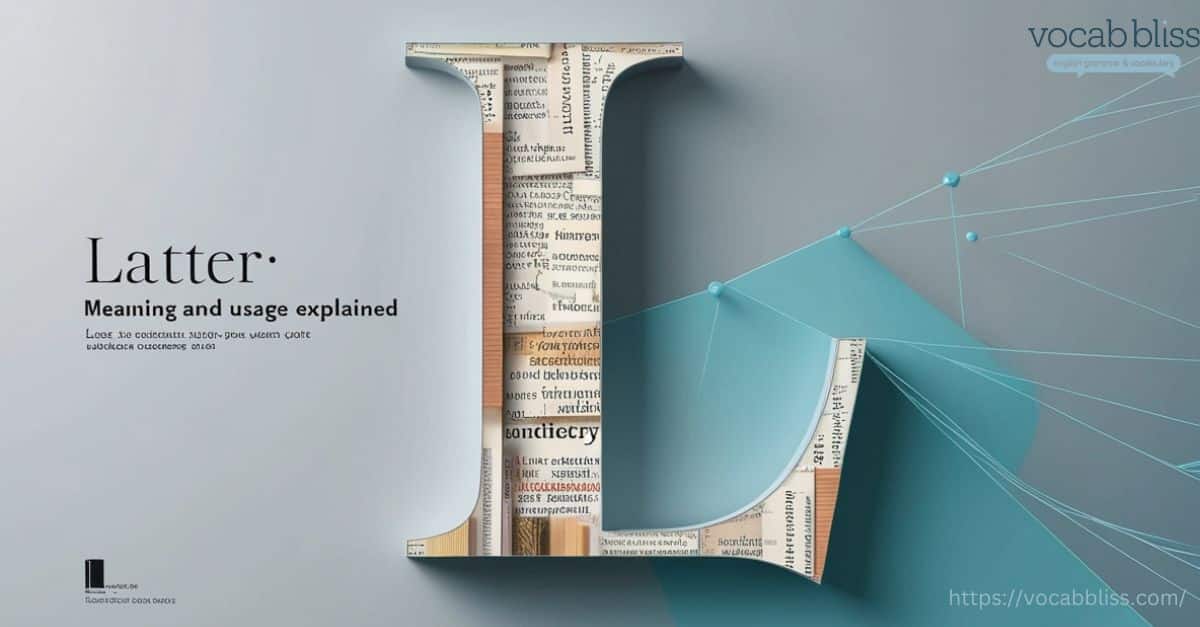Choosing the correct word can be tricky, especially when words sound similar but have entirely different meanings. One common confusion arises with “Latter or Ladder.” Both are frequently used in English, but their meanings and contexts differ significantly. In this article, we’ll dive into their definitions, usage, and key differences, ensuring you never mix them up again.
Quick Summary
In this article, we’ve explored the subtle yet important differences between “Latter or Ladder.” Understanding these distinctions is crucial for clear communication. “Ladder” refers to a physical or metaphorical tool for climbing, while “latter” is used to indicate the second of two options or items. Common mistakes arise from their similar sounds and spellings, but with the right mnemonics and practice, you can confidently use these words correctly in both writing and speech. By grasping the definitions and applying the tips shared here, you’ll be equipped to distinguish between “ladder” and “latter” effortlessly.
Explore further: Flavour or Flavor: Understanding the Correct Usage
Understanding the Basics of Latter or Ladder
What Are the ladder or latter?
When it comes to the English language, “Latter or Ladder” are two words that look and sound similar but serve entirely different purposes.
Definitions
- Ladder:
A ladder is a tool with two parallel sides connected by rungs, designed for climbing. It can also symbolize advancement or progress in a metaphorical sense, such as “climbing the ladder of success.” - Latter:
The word latter is an adjective used to indicate the second of two items mentioned in a sequence. For example, “Between reading and writing, I enjoy the latter more.” It can also mean “more recent” when referring to periods or stages of time.
Origins
- Ladder:
The word originates from the Old English term hlæder, meaning “steps” or “stairway.” Its association with climbing and movement has remained consistent over centuries. - Latter:
Derived from the Old English word lætra, meaning “slower” or “following,” it evolved to signify the second or subsequent item in a comparison.
How They Differ
| Feature | Ladder | Latter |
|---|---|---|
| Meaning | A climbing tool or metaphor for progress | The second of two items in a sequence |
| Part of Speech | Noun | Adjective |
| Example | “He climbed the ladder to fix the roof.” | “I like apples and oranges; the latter is sweeter.” |
Why Do People Confuse Them?
The confusion between “Latter or Ladder” primarily stems from their phonetic similarities and spelling differences.
Phonetic Similarities
- Both words begin with “lad-” and share similar vowel sounds, especially in rapid or casual speech.
- In some dialects or accents, the subtle distinction between their pronunciations—/ˈlædər/ (ladder) vs. /ˈlætər/ (latter)—can be hard to detect.
Spelling Differences
- While “ladder” has a double “d,” “latter” has a double “t.” This small distinction is easy to overlook, particularly for non-native speakers or when writing quickly.
Breaking Down “the Ladder Meaning” and Usage

Ladder: Definition and Parts of Speech
The term “ladder” is most commonly recognized as a noun. It refers to a portable structure with two vertical sides connected by horizontal steps, or “rungs,” used for climbing. Beyond its literal meaning, ladder is also used metaphorically in various contexts, symbolizing progress or advancement.
Literal Usage
- Definition: A tool designed to help people climb vertically.
- Example: “The firefighter used a ladder to rescue the kitten from the tree.”
Metaphorical and Idiomatic Uses
- Metaphor for Progression: The ladder often represents steps toward achieving a goal, such as career advancement.
- Example: “She’s climbing the corporate ladder.”
- Idiomatic Expressions:
- “A step on the ladder” – meaning progress toward a larger goal.
- “The ladder to success” – symbolizing the journey of improvement or achievement.
Practical Examples of Ladder in Sentences
Here’s how “ladder” can be applied in everyday language:
- Literal Context:
- “The painter leaned the ladder against the wall to reach the ceiling.”
- “Be careful not to overextend the ladder; it could topple over.”
- Metaphorical Context:
- “Achieving her master’s degree was just the first rung on the ladder to her dream job.”
- “He felt stuck at the bottom of the social ladder.”
- Idioms and Expressions:
- “Don’t skip rungs on the ladder of success—it’s important to build a strong foundation.”
- “Life’s challenges are like a shaky ladder; each step requires balance and courage.”
When to Use Ladder Correctly
Physical Objects
Use “ladder” when referring to:
- A tool for climbing, such as a fireman’s ladder, rope ladder, or stepladder.
- Specific scenarios involving height, repair, or construction.
Examples:
- “The ladder in the garage is broken; we need a new one.”
- “He carried the ladder to the orchard to pick the ripest apples.”
Abstract Progressions
Use “ladder” in a figurative sense when describing:
- Career growth or hierarchical systems.
- Personal development or milestones.
Examples:
- “Her promotions were steady steps on the ladder of her career.”
- “Social mobility is like climbing a ladder—opportunities vary with each step.”
Latter: Meaning and Usage Explained

Latter: Definition and Parts of Speech
The word “latter” is an adjective used to indicate the second of two items mentioned in a sequence. It serves as a contrast to the first item, often helping clarify choices or preferences in writing or speech.
Definition
- Meaning: Refers to the second item or option in a comparison.
- Example: “Between tea and coffee, I prefer the latter.”
Origin and Historical Context
The word “latter” comes from the Old English term lætra, which originally meant “slower” or “following.” Over time, it evolved to signify “the second of two” or “the more recent.” Its usage remains consistent in modern English, helping speakers distinguish between two options or time periods.
Examples of Latter in Sentences
Everyday Usage
- “Between hiking and swimming, the latter is more relaxing.”
- “The novel is divided into two parts, and the latter half is much more thrilling.”
- “She was offered a choice between the blue dress and the red one, and she chose the latter.”
Phrases with Latter
- “The latter half of the year”: Refers to the second six months (July through December).
- Example: “Sales typically increase in the latter half of the year.”
- “The latter stages”: Refers to the final phases of a process.
- Example: “The latter stages of the project require detailed review and editing.”
When to Use Latter Correctly
Use “latter” in contexts where you’re referring to:
Sequences
When discussing two items in a list, “latter” highlights the second:
- “Between apples and oranges, the latter is juicier.”
- “The debate was divided into two rounds; the latter round was more intense.”
Comparisons
Use “latter” to compare two options or periods:
- “The former is a traditional choice, while the latter is more modern.”
- “In comparing summer and winter, the latter is colder but more festive.”
Time Periods
When referencing the end or second half of a period:
- “The latter part of the 20th century witnessed significant technological advances.”
- “In the latter weeks of the semester, students often feel the pressure of exams.”
Understanding how to use “latter” correctly allows for clarity and precision, especially in formal writing or discussions involving comparisons. By practicing its application in sentences and recognizing its specific role as an adjective, you’ll master its usage with ease.
Latter or Ladder: Clear Comparisons
Definition, Pronunciation, and Grammar
Though “Latter or Ladder” sound similar, they are distinct in meaning, pronunciation, and grammatical usage. Here’s a side-by-side comparison to make things crystal clear:
| Feature | Ladder | Latter |
|---|---|---|
| Definition | A tool used for climbing, typically made of rungs and sides. | Refers to the second of two items mentioned or compared. |
| Part of Speech | Noun | Adjective |
| Pronunciation | /ˈlædər/ (rhymes with “adder”) | /ˈlætər/ (rhymes with “matter”) |
| Usage | Physical climbing or metaphorical progression. | Sequencing or making comparisons. |
| Example | “He used a ladder to clean the gutters.” | “Between coffee and tea, the latter is my favorite.” |
Visualizing the Difference
A quick-reference chart can help solidify your understanding of “the Latter or Ladder” with usage scenarios and examples:
| Scenario | Ladder | Latter |
|---|---|---|
| Climbing a tree or building | “The ladder reached the roof.” | ✖ Not applicable |
| Career or personal progress | “She climbed the corporate ladder to reach management.” | ✖ Not applicable |
| Mentioning two items | ✖ Not applicable | “Of the two books, I enjoyed the latter more.” |
| Time references | ✖ Not applicable | “The latter half of the year is usually busier.” |
| Pronunciation reminder | Sounds like “lad + der” | Sounds like “lat + ter” |
Examples in Context
- Ladder Example:
- “The painter set up his ladder and began touching up the ceiling.”
- “Achieving her promotion was just one rung on her ladder to success.”
- Latter Example:
- “He prefers chocolate or vanilla ice cream? The latter, of course!”
- “The latter part of the movie had me on the edge of my seat.”
Common Mistakes and How to Avoid Them
Everyday Missteps latter vs ladder
Mixing up “Latter or Ladder” happens more often than you might think. Their similar pronunciation and spelling confuse even seasoned writers. Here are some common errors and why they occur:
Examples of Misusing Latter or Ladder
- Incorrect: “The ladder option seems more appealing.”
- Why It’s Wrong: The sentence compares two options, so “latter” (referring to the second choice) should be used.
- Correct: “The latter option seems more appealing.”
- Incorrect: “He climbed the latter to fix the roof.”
- Why It’s Wrong: You’re referring to a physical object used for climbing, so the correct word is “ladder.”
- Correct: “He climbed the ladder to fix the roof.”
- Incorrect: “Between summer and winter, the ladder is colder.”
- Why It’s Wrong: Here, you’re comparing two seasons. Use “latter” for the second item in a pair.
- Correct: “Between summer and winter, the latter is colder.”
Why Autocorrect Often Fails
Spell-check tools and autocorrect can’t always save the day. Since both “Latter or Ladder” are valid English words, a typo may go unnoticed. For example:
- Typing “latter” when you meant “ladder” won’t trigger a correction because both are spelled correctly, just misapplied.
Quick Tips to Remember

To avoid these mix-ups, use simple mnemonics or memory tricks:
- “Ladder has steps; latter is second.”
- Visualize a ladder with steps to help remember it refers to climbing, physically or metaphorically.
- For “latter,” think of a sequence: first, then second.
- “A ladder you climb; a latter is in time.”
- Associate “ladder” with climbing and physical objects.
- Link “latter” to timing or choice in a sequence.
- Think “Rungs and Rank” for Ladder:
- Ladder involves climbing rungs or advancing ranks in progression.
- Think “Last in Line” for Latter:
- Latter always refers to the second or last item in a pair.
Table: latter vs ladder Recap
| Word | Quick Memory Trick |
|---|---|
| Ladder | “Climbing the ladder of success” = steps or progress. |
| Latter | “Latter = later in the list” = second of two. |
By using these tricks and staying mindful of the context, you’ll dodge common pitfalls and use “Latter or Ladder” like a pro.
Test Your Knowledge latter vs ladder
Fill-in-the-Blanks Exercise
- She prefers hiking to swimming; the ________ is less tiring.
- The fireman used a ________ to rescue the child.
- The ________ half of the year is typically busier for retail stores.
- Success doesn’t come overnight; you have to climb the ________.
Match-the-Word Game
| Sentence | Word (Ladder/Latter) |
|---|---|
| The ________ was propped against the tree. | Ladder |
| Of the two options, I’ll go with the ________. | Latter |
Frequently Asked Questions
- How Do You Spell Ladder?
Ladder is spelled L-A-D-D-E-R, with a double “d.” - Is It Latter or Ladder?
It depends on the context. Use ladder for climbing tools and latter for the second of two items. - What Are Common Examples of Latter?
“Tea and coffee were served; the latter was preferred.” - What Does Ladder Mean Figuratively?
It symbolizes progression or advancement, such as in “climbing the career ladder.” - Do the Two Words Share the Same Pronunciation?
No, they have subtle differences: ladder (/ˈlædər/) vs. latter (/ˈlætər/). - ladder of the two?
When choosing between “latter vs ladder”, use “ladder” if you’re referring to a physical tool for climbing or a metaphorical advancement. Use “latter” when indicating the second of two items in a comparison.
Conclusion
Summarizing Key Takeaways
Understanding the distinction between “ladder or latter” can make a world of difference in your writing and communication. Let’s recap the essentials:
- “Ladder” is a noun that refers to a tool with steps, often used for climbing or as a metaphor for progress. Think of phrases like “climbing the ladder of success.”
- “Latter” is an adjective used to indicate the second of two items in a sequence. It’s often paired with comparisons, such as “The latter option is better.”
- While they sound alike, their meanings, usage, and grammatical roles are distinct.
Tips to Avoid Confusion
- Use mnemonics like “ladder has steps; latter is second” to keep them straight.
- Pay attention to context—whether you’re referring to a climbing tool or comparing two items.
- Practice with examples. Write sentences using both words to reinforce their proper usage.
Practice Leads to Confidence
Mastering these words requires a little effort, but it’s worth it. When you use “ladder or latter” correctly, your writing will be clearer and more polished. So, don’t hesitate to experiment in everyday speech and writing. The more you practice, the more natural it’ll feel.
Remember, words are tools, and using them effectively is like climbing a ladder to better communication. By understanding the nuances of “ladder or latter”, you’ll avoid common mistakes and impress your readers with precise language. Happy writing!
Dive Deeper:
- Vicious vs Viscous: How to Use Them Correctly in Writing
- Is it Heel vs Heal: Grasping the Difference?
- How Do You Spell Christmas, Christmases, or Christmas’s?
- Analogy vs Allegory: What’s the Difference?

Jorge Phillips is an experienced blogger who writes for Vocab Bliss, sharing his passion for the English language. With a knack for simplifying complex grammar rules and a focus on commonly confused words, Jorge helps readers navigate the nuances of English with ease. His insights aim to make learning engaging and practical.







